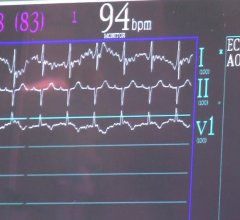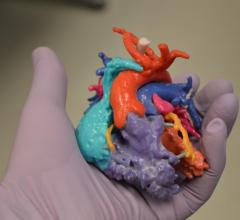July 12, 2017 — At the 2017 annual meeting for the Society of Cardiovascular Computed Tomography (SCCT), Ziosoft showed ...
July 12, 2017 — Cardiac Insight Inc., a U.S. developer of wearable medical devices and diagnostic software, announced ...
July 12, 2017 — SanBio Inc. recently announced it has been awarded a $20 million grant from the California Institute of ...
Providing exceptional cardiovascular care for patients to achieve the best possible outcomes is the number one goal for ...
The incidence of sudden cardiac arrest, an often deadly loss of heart function, declined significantly among previously uninsured adults who acquired health insurance through the Affordable Care Act, a new study shows.
iRhythm Technologies Inc. announced a collaboration with the Stanford Machine Learning Group that has resulted in the development of a deep learning algorithm capable of expert-level detection of 14 cardiac output classes, including 12 arrhythmias as well as sinus rhythm and noise from artifact. The collaboration leveraged the iRhythm data science and clinical teams’ expertise in electrocardiogram (ECG) analysis, as well as iRhythm’s expansive labeled electrocardiogram (ECG) dataset to produce an arrhythmia detection algorithm. The classifications include atrial fibrillation, atrial flutter, complete heart block, second degree AV block and ventricular tachycardia, among others.
Todd Villines, M.D., FACC, FAHA, FSCCT, director of cardiac CT, Georgetown Medical Center, and president of the Society of Cardiovascular CT (SCCT), discusses evidence being presented over the past several years for the use of cardiac CT at SCCT 2017.
Cardiac positron emission tomography (PET) is growing in popularity among cardiologists because it provides the ability ...
David Bluemke, M.D., Ph.D., FAHA, professor of radiology, University of Wisconsin - Madison, incoming editor of RSNA’s ...

The U.S. Food and Drug Administration (FDA) has cleared an additional indication to expand the use Medtronic's self-expanding CoreValve Evolut transcatheter aortic valve replacement (TAVR) platform to patients deemed to be at intermediate risk for open-heart surgery.
Blood clots in veins and arteries can lead to heart attack, stroke and pulmonary embolism, which are major causes of mortality. In the featured article of The Journal of Nuclear Medicine’s (JNM) July 2017 issue, German researchers show that targeting GPIIb/IIIa receptors, the key receptor involved in platelet clumping, with a fluorine-18 (18F) labeled ligand is a promising approach for diagnostic imaging. Current imaging modalities rely on structural characteristics, such as vascular flow impairment, and do not address the critical molecular components.
When performing radiofrequency (RF) ablation to treat cardiac arrhythmia, medical professionals must balance the safety ...
Researchers at the George Washington University (GW) found that certain symptoms are more and less predictive of patients’ risk for acute coronary syndrome (ACS), which includes heart attack, in patients of different gender and race.
BTG plc recently highlighted the results of the ACCESS PTS trial, presented at the Society for Vascular Medicine 28th Annual Scientific Sessions, June 14-17 in New Orleans. The study found chronic deep vein thrombosis (DVT) patients with post-thrombotic syndrome (PTS) can be treated safely and effectively with Ekos therapy. The ACCESS PTS protocol using Ekos therapy is now the only treatment regimen proven to significantly reduce the signs and symptoms of PTS and show a significant improvement in quality of life, according to the company.
Sex-specific cardiovascular drug dosages are needed to reduce adverse reactions in women, according to a position paper from the European Society of Cardiology published in the June issue of European Heart Journal - Cardiovascular Pharmacotherapy.
Change Healthcare Cardiology Hemodynamics is an integrated hemodynamic monitoring system for monitoring vital signs and ...
July 6, 2017 — New data showed use of Medtronic’s cardiac resynchronization therapy (CRT) devices with its proprietary ...
GE Additive and Stryker have entered a partnership agreement to support Stryker’s growth in additive manufacturing. The agreement covers new additive machines, materials and services for Stryker’s global supply chain operations. The announcement was made at GE’s Minds + Machines event, the company’s industrial internet event dedicated to software, innovation and the sharing of digital industrial outcomes.
Two predictive models may help cardiologists decide which patients would most benefit from an implantable cardioverter defibrillator (ICD), suggests a new study published in the Journal of the American College of Cardiology. According to the researchers, confirming the findings in a larger, randomized trial could lead to new national guidelines for choosing patients who are good candidates for ICD implantation.


 July 12, 2017
July 12, 2017
















